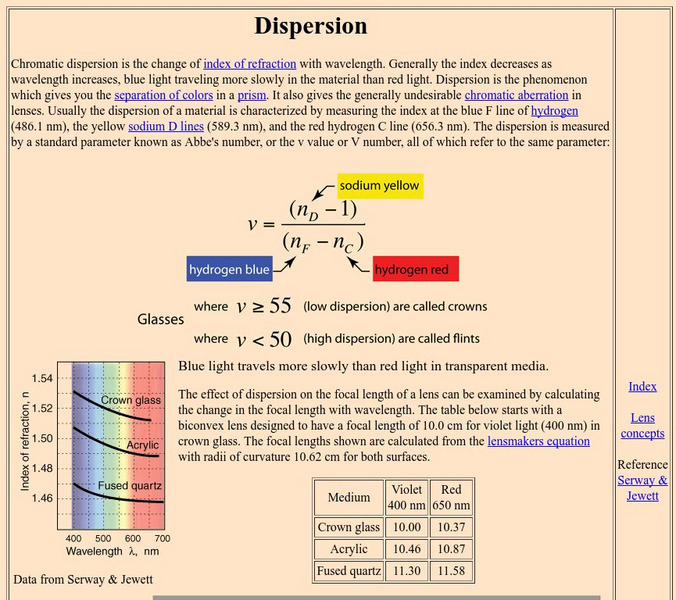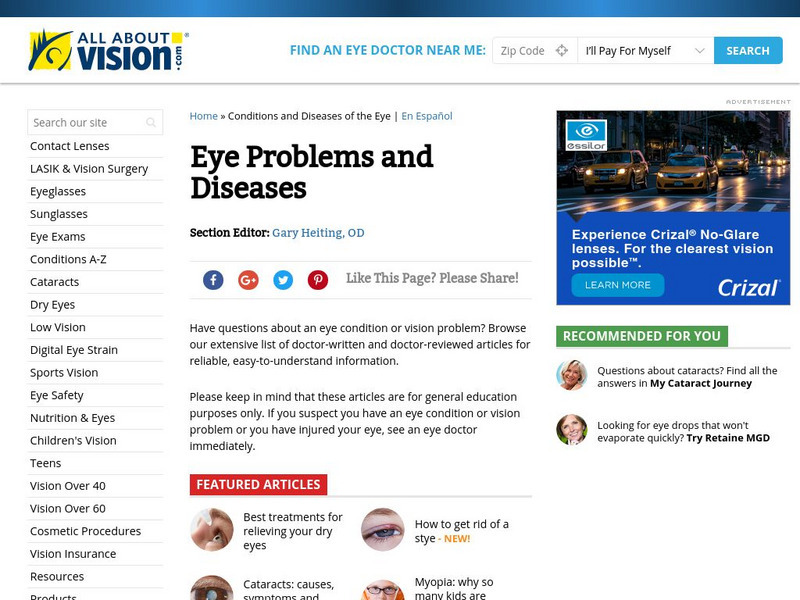Curated OER
Reflection and Refraction
Life is only a reflection of what we allow ourselves to see. The lesson includes three experiments on light reflection, light refraction, projection, lenses, and optical systems. Each experiment builds off the ones before and...
It's About Time
Refraction of Light
Don't shine like a diamond, refract light like a diamond. Young scientists use an acrylic block and a laser light to observe refraction. Advanced scholars figure the sine of the angles of reflection and incidence as well as mastering...
Curated OER
Refraction Through a Circular Disk
In this refraction through a circular disk worksheet, students are given a diagram of a circular disk of leaded glass with light striking it. Students use the diagram to find the angle of incidence of the light, the angle of refraction,...
Curated OER
Take-Home Midterm Exam #3, Part A
Let your physics learners take this electromagnetic radiation exam home to show what they know. You could also use it in class or assign it as a review. The content covers concepts pertaining to color, wavelength, frequency,...
Curated OER
The Bending and Bouncing of Light
Students investigate refraction and reflection of light. For this light lesson, students perform 3 activities to observe light interacting with matter by using a flashlight. They explore refraction using a glass of water and reflection...
CK-12 Foundation
Least Time
What is the fastest way to get from point A to point B if you are going through two different mediums, such as air then water? Scholars explore the way light travels through air, water, acrylic, glass, and diamond as they answer this...
CK-12 Foundation
Diamond Cut
How do jewelers tell the difference between diamonds, glass, and cubic zirconia? A sparkling simulation demonstrates how to use a ray of light to determine the substance and ideal shape for a diamond. Scholars control the material,...
Discovery Education
Through the Looking Glass
Turning white light into colors only takes a little scientific know how! Young scholars create their own spectroscope in a hands-on activity exploring the properties of light. Using a diffraction grating, they discover how white light...
Curated OER
Enlightening Explorations, Part II
Sixth graders review their results from the previous experiments. After viewing a kaleidoscope, they make their own pattern on paper and describe the role of light. To end the lesson, they examine light being relfected and refracted and...
Curated OER
Exploring Microscopes
Students explore the parts of a microscope. In this microscope lesson, students examine simple and compound microscopes. Students discover how the parts of a microscope work together to generate an image.
Curated OER
Stations of Light
Student groups rotate through four stations to examine light energy behavior: refraction, magnification, prisms and polarization. They see how a beam of light is refracted (bent) through various transparent mediums. Learners investigate...
American Institute of Physics
The Black Scientific Renaissance of the 1970s-90s: African American Scientists at Bell Laboratories
A two-part lesson asks young scientists to research the contributions of African American scientists at Bell Laboratories. After presenting their findings, class members watch two demonstrations that introduce them to total internal...
Curated OER
How Light Moves
Students study the movement of light. In this light lesson, students work in groups to participate in a light and shadow walk around their neighborhood. Students brainstorm rules for light movement and watch videos about light travel,...
Curated OER
THE MANY COLORS OF SUNLIGHT
Students examine rainbow components, spectral colors, colors perceived by the eye, hot solids, glowing rarefied gas, absorption, that light is a wave, and optics.
Curated OER
(S-4) The Many Colors of Sunlight
Students observe and explore the characteristics of light.
Curated OER
Why is the Sky Blue?
Students explore diffusion or scattering of light. In this physics lesson, students explain why the sky is blue and sunsets/sunrises are red.
Curated OER
Microscopes and Telescopes
Students analyze a microscope and study what they do. In this investigative instructional activity students study how microscopes were first invented, and how ray diagrams are used in conjunction.
Curated OER
Physical Optics: The Wave Nature of Light
Students are introduced to the wave nature of light. In groups, they discuss Young's experiment and how diffraction and interference demonstrate the wave nature of light. Using examples, they show constructive and destructive...
Curated OER
Enlightening Explorations, Part III
Sixth graders continue their examination of light. In groups, they make rainbows and examine the spectrum of visible light. They travel between various stations recording their observations about the behaviors of light. To end the...
TeachEngineering
Teach Engineering: Make That Invisible! Refractive Index Matching
Students determine the refractive index of a liquid with a simple technique using a semi-circular hollow block. Then they predict the refractive index of a material (a Pyrex glass tube) by matching it with the known refractive index of a...
Optical Society
Optical Society of America: Optics for Kids: Lose a Glass in a Glass
This is an activity that should only be done outdoors or in a well-ventilated area, with adult supervision, as it involves paint thinner. It demonstrates the concept of the index of refraction for different materials, in this case that...
Georgia State University
Georgia State University: Hyper Physics: Dispersion
The phenomenon of light dispersion is explained with a formula and a practice form for calculating Abbe's number.
Other
All About vision.com: Eye Conditions and Diseases
Many articles with consumer information about lenses, eyewear, eye problems, and unique eye conditions. Vast content and many links to off-site information.






















